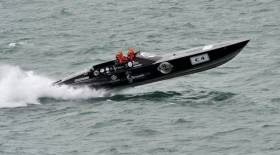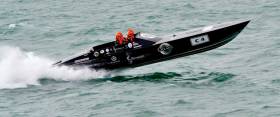Displaying items by tag: Allblack Racing
Irish Powerboat Racing Team Claims New Cork-Fastnet-Cork Record
#Power - Irish powerboat racing team Allblack Racing claimed a new record on the Cork-Fastnet-Cork route this past summer.
The team’s Allblack SL44 powerboat set a time of two hours, six minutes and 47 seconds, with an average speed of 100.99 kmh in moderate to rough Atlantic conditions. The new record was ratified on August 29 by the Union Internationale Motonautique (UIM).
And the Irish Powerboat Club has since commissioned the FPT Allblack Trophy in the event the record is broken in the future.
For now, the trophy will be kept at the world’s oldest yacht club, the Royal Cork.
Allblack Racing’s record-breaking powerboat is powered by two FPT Industrial N67engines, which have a 6.7l displacement, four valves per cylinder and a maximum power of 560hp.
The Arklow-based team, headed by team driver John Ryan, already holds another world record for the Round Ireland route. More recently, they placed third at the Cowes Torquay Cowes 2017 UIM Marathon.
Last year the team set its sights on completing 11 world records in offshore speed and endurance by 2020.
#Powerboats - An Irish-based powerboat racing team is aiming for a full 11 offshore endurance and speed records over the next three years.
“It’s ambitious, but it’s do-able,” as Red Bull hears from John Ryan, team driver and throttle man with Allblack Racing and an Afloat.ie Sailor of the Month in his own right for Team Hibernia’s record-smashing Round Ireland powerboat run.
The 11 challenges of the Union International Motonautique (UIM) offshore ocean endurance long distance and speed records represent a step beyond for Ryan and his team mates.
Allblack Racing will take to Irish waters again for the Cork-Fastnet loop and the Round Britain and Ireland challenge, as well as the Round Anglesey run in the Irish Sea and Menai Strait.
The team will also tackle various taxing European routes such as an Italian speed trial from Naples to Capri, a blast between the Channel Islands and the Isle of Wight, and a straight 60-hour run from London to Monte Carlo.
That’s not to mention the epic routes from London to St Petersburg and Miami to New York that will complete the list — all raced on the team’s Swedish-designed Allblack SL44 that's been specially adapted for extreme racing.
Allblack from Konjow Films on Vimeo.
What’s more, there’s an opportunity for additional passengers to join Ryan and his team mates Philip Fitzgibbon and Ant Middleton — if you can bring funding for the demands of each record, you could get trained up and listed as co-driver for the fourth seat on the boat.
Red Bull has much more on the story HERE.






























































